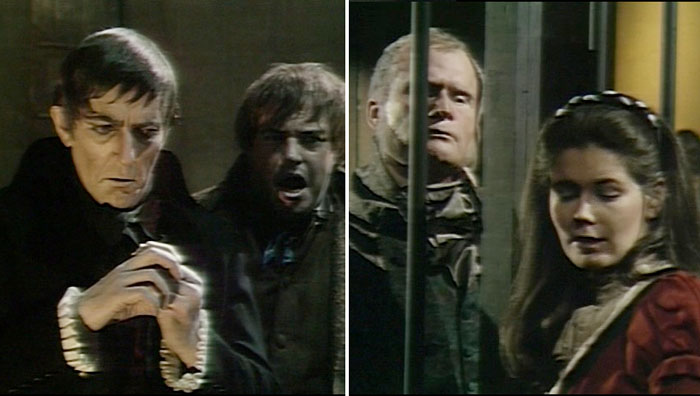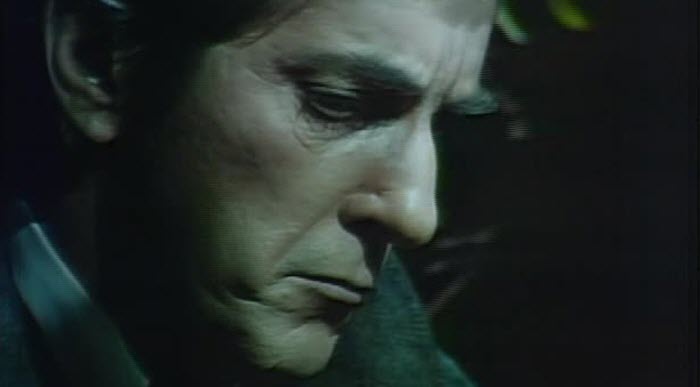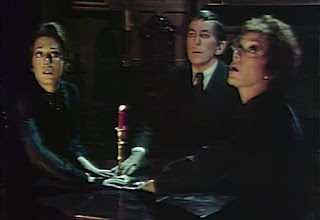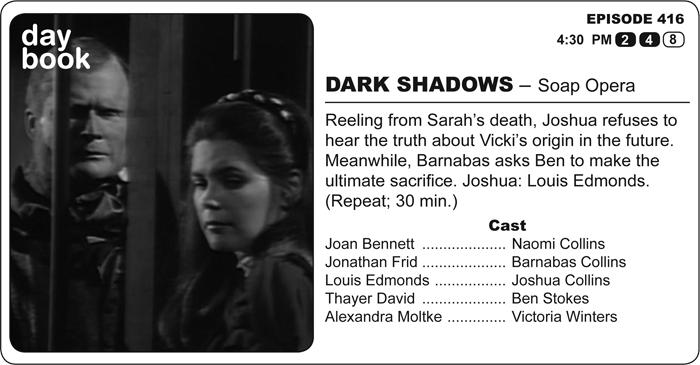
By PATRICK McCRAY
Taped on this date in 1968: Episode 416
In the wake of Sara‘s death, Barnabas Collins has one more life to eliminate: his own. Joshua: Louis Edmonds. (Repeat; 30 minutes)
Desperate for an answer to his daughters death, Joshua confronts Victoria, who admits to being from the future. Her statement falls on deaf ears. Barnabas, aware of the engine of suffering he has become, instructs Ben to destroy him.
I don’t think it’s any big secret that the Dark Shadows scripts didn’t really demand much of Louis Edmonds. You can’t say that he’s a lazy actor by any means. He has a bag of tricks that the writers clearly enjoy, because they largely restrict his choices to those. But there are times when it’s clear that they sit back and remember why he was hired. This is one of those times.
It’s an episode that defines the hope of death while immersed in the torment it creates for the living. The beauty of a show like Dark Shadows is that it’s luxurious and expansive running time allows it to focus on rituals like death with a length and depth that only real life can match. Not only is Sarah dead, but we feel as if we have spent several days morning for her. And while Naomi slips into drinking and open acceptance, Joshua, stripped of control, seeks the very thing he has lost. At this point, the only control left is blame. It’s a painfully pathetic attempt. He attacks Vicki. Vicki comes out of the closet as a time traveler. And for just a flash you know that he believes her. It makes as much sense as anything, if not more. But believing her means blaming someone else. And his mind simply cannot brook another mystery.
Watching Edmonds in this episode is a bit like watching Zeus at his full wrath. From what I understand, Edmonds was a happy and ebullient man. Don’t trust it. The merriest among us, and I’m sure this won’t come as a shock, are the most rife with secret pain. I don’t need a tell-all to reveal that. The power and truth and pain and fury that he displays in this episode is too controlled and too authentic to be reflective of the imagination. I don’t know what dark, inner horror Edmonds saw when he looked at the words of the script, but he summons something bordering on the alchemical. Far from histrionic, this is simply real. It’s even subtle and modulated, somewhere between a man performing an exorcism and winning a bet over whether or not he can act.
He can. He can act anyone off that soundstage.
There’s a lot in 1795 that just kind of sits there. It can be interminable. And at the same time, it contains the show at its rawest. This episode is its most painful study in survivors remorse. Barnabas, in death, finds himself more alive than ever. Reduced to the means of evil to survive, he discovers a depth of responsible morality that would shame a saint; the only thing that stops him from using his curse to hornswoggle the local yokels into assuming that he is also the occult source of their ills is his mother. Barnabas has lived out the fantasy of seeing his own funeral, and sees it for the nightmare it is. His mother is suffering it all over again, trapped in the unnatural fever dream of burying her second child in weeks. Were Barnabas to reveal himself and take the fall, it would force her to live that fate for a third time.
As Louis Edmonds explores the peaks of the landscape of sorrow, Jonathan Frid and Thayer David plunge down to the blistering mantle of remorse. How many times must Barnabas hear that Ben is his friend before he believes it? And how many times does Ben need to hear his master beg for just one, single yes before he can let go?
As much as Barnabas is a hero for trying to eliminate himself from Collinsport’s suffering, the plight of Ben Stokes is even more profound. He is incapable of seeing anything but the friend within. Every day brings a new truth and a new terror for him. But in the face of the questionable motives of so many others in 1795, his is pure. In many ways, he is one of the two greatest loves Barnabas Collins will ever know and never accept. And he could very well go to his grave knowing no other.
In fact, I guarantee it.
This episode hit the airwaves Jan. 29, 1968.



